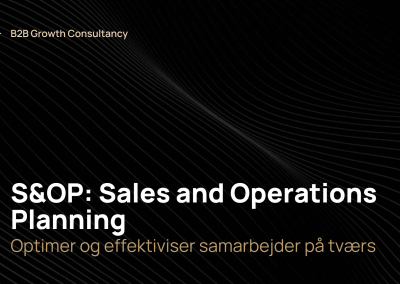Customer Relationship Management (CRM ) strategies play an essential role in running a successful business, where customer satisfaction and efficient sales processes are paramount. In this blog post, we will explore the importance of a CRM strategy, the benefits of implementing it correctly and a step-by-step guide to creating an effective strategy.
What is a CRM strategy?
A CRM strategy is a plan to build and maintain relationships with customers through the use of a CRM system. By implementing a solid CRM strategy, you can strengthen your brand, drive digitalization and retain customers effectively. A well-defined CRM strategy focuses on optimizing the customer experience and streamlining the sales process through data and automation.
When defining a CRM strategy, it’s crucial to identify your business goals and key focus areas. By identifying your goals, you can focus on the areas where a CRM system can have the biggest impact. This involves analyzing your customer needs, customer journey, customer relationships and segmentation to develop a deeper understanding of the specific needs of different customer segments so your brand can best meet them.
It’s important to set measurable success criteria for your CRM strategy – this allows for continuous evaluation and adjustment of efforts towards retaining and developing relationships and digitizing the sales process.
The benefits of effective CRM strategies
An effective CRM strategy has many benefits. Below we look at four key benefits of implementing an effective CRM strategy.
Increased customer loyalty
An effective CRM strategy can help you build and maintain customer loyalty. By using data from the CRM system, you can identify customer needs, wants and preferences, making it possible to offer tailored solutions and personalized service.
This creates a closer relationship between you and the customer: it makes the customer feel valued, leading to greater loyalty, repeat purchases or upgrading their service.
Streamlined sales process
An effective CRM strategy also helps streamline the sales process. With all relevant information about leads in one place, following up on prospects and sharing information within the team, the entire sales process becomes more structured and efficient, allowing for faster conversions.
Furthermore, implementing a CRM system allows you to focus on core tasks as it can automate tasks such as lead generation, quoting and follow-ups when trying to attract customers. Likewise, a CRM system allows you to analyze data and identify effective sales techniques, leading to better results.
Optimized customer service and support
By implementing a CRM strategy in your business, you can achieve optimized customer service and support. This will help strengthen the relationship with your customers and increase their satisfaction with your company. Here are some ways you can optimize customer service and support using a CRM system:
- Centralize customer data for quick access
- Automate support processes for efficient problem resolution
- Personalize communication based on previous interactions
- Possibility of self-service through online portals or chatbots.
With these actions, your business will be better equipped to deliver an excellent customer experience and handle any challenges effectively.
Better decision-making with data analytics
In-depth analysis of KPIs reveals trends and patterns that can be used to make better decisions. By analyzing buying behavior, you can also identify potential revenue opportunities. Additionally, data analysis helps identify areas where additional training or resources are needed.
- Identifying trends and patterns through in-depth KPI analysis
- Analyze buying behaviour to find potential revenue opportunities
- Identifying the need for additional training or resources
Generic vs. Customized CRM Strategy: Which should you choose?
When it comes to choosing a CRM strategy, there are two options to consider: a generic CRM strategy or a customized CRM strategy.
The differences between generic and tailor-made CRM solutions lie, among other things, in:
- Functionality: Generic CRM solutions can have limitations as they are not tailored to your specific needs. Tailor-made CRM solutions allow you to customize and integrate features that fit your business perfectly.
- Cost: Generic CRM solutions may be more cost-effective in the short term, but customized solutions can provide greater value in the long term by meeting precise requirements and reducing inefficiencies.
- Implementation: The implementation of generic CRM solutions is often faster and easier compared to customized solutions. However, bespoke solutions require more time and resources to build a unique platform based on your business needs.
While it can be tempting to take the easy way out with a generic solution, you should consider the specific requirements of your business. A tailored strategy allows you to achieve optimal efficiency in the sales process and deliver personalized and measurable results in the customer service experience.
Benefits of a customized CRM strategy
When you choose a customized CRM strategy, you get the following benefits, among others:
- Scalability: A customized CRM strategy allows your business to meet future growth needs. By tailoring the CRM solution to your unique needs, you can easily add new features, modules or custom processes as your business grows. This ensures smooth and efficient scaling of your CRM system without loss of data or workflow.
- Customer experience: A tailored CRM strategy has a huge impact on customer experience. By creating more personalized and targeted communication with your customers, you can provide them with better service and build stronger relationships. With a customized strategy, you can also automate personalized interactions based on customer preferences and behaviour, increasing their engagement and loyalty over time.
- Data insights: A customized CRM strategy gives you extra insights into your company’s data. By defining specific metrics, key performance indicators (KPIs) and reporting systems according to your needs, you get in-depth analytical information about sales and marketing activities and customer behaviour. This additional insight helps you understand your customers’ needs, identify trends and make informed decisions to optimize both the sales process and overall business efficiency.
CRM strategy step-by-step: Here’s how
Phase 1: Analysis and identification of needs
Start your CRM strategy by analyzing your company’s current situation and identifying the specific needs that a CRM system must meet. This will give you a clear direction for implementation.
Phase 2: Involve your colleagues/employees
Involve employees across different departments to ensure their perspectives and needs are heard and considered during implementation. It’s important to secure buy-in and commitment from management, as it sends a signal about the importance of the CRM system to you.
Organize training or information sessions where employees can learn about the CRM system’s features and have the opportunity to ask questions. This will help ensure a smooth transition to using the system.
Phase 3: Choosing a CRM system
Define clear specifications based on your company’s unique needs. This will help you find the right CRM system that fits your specific requirements and expectations. Conduct a thorough evaluation and comparison of different CRM systems to identify the best options for your business. Also, talk to IT solution experts or advisors who can provide guidance and insight into choosing a suitable CRM system.
Remember to define clear specifications, carefully evaluate different systems and seek expert advice before making your final choice of CRM system.
Read also: “The 10 best CRM systems 2023“
Phase 4: CRM system implementation
- Educate and train employees in the use of the chosen CRM system.
- Monitor the implementation process to ensure a seamless integration between existing systems and the new CRM.
- Test and adjust continuously to optimize the efficiency of your CRM system.
Phase 5: Monitoring and optimization
Keep an eye on important KPIs to measure the effectiveness of your CRM system. Identifies areas for improvement and implements ongoing changes based on data insights.
3 tips for creating your CRM strategy
Below are 3 tips for creating your CRM strategy, we have gathered through the implementation of over 100 HubSpot and monthly optimization of HubSpot through HubSpot as a Service.
- Be realistic about your expectations for implementing a new CRM system. While it can be exciting to think about the potential benefits and outcomes, it’s important to realize that successful implementation requires time and resources. So make sure you have realistic goals and plans.
- Make sure you communicate clearly and concisely about the changes that will happen as part of the strategy. It’s crucial to get the entire organization on board by effectively communicating the changes and involving all relevant parties in the process. This will help ensure a smooth implementation and minimize resistance or uncertainty.
- Invest time in employee training to ensure effective use of the system. A good CRM system can only maximize its potential if employees have the necessary knowledge and skills to use it correctly. Dedicate time for training, follow-up sessions and support for optimal utilization of the system.
Best practices for effective CRM strategies
Understand your customers’ needs and expectations
An effective CRM strategy requires an in-depth understanding of your customer’s needs and expectations. Through customer analytics, A/B testing and reports, you can identify the most valuable information about your customers. This will help you tailor your communication and service to their preferences, resulting in better customer experiences.
Involve all relevant departments
To ensure the success of your CRM strategy, it’s important to involve all relevant departments in your company. Sales, marketing and support departments should work closely together to realize the full potential of the CRM system. By sharing data across departments, you can take a more holistic approach to your customer interactions and coordinate efforts for a more effective sales process.
Update and maintain data
Continuously updating and maintaining data is essential for a successful CRM strategy. Ensure regular checking of collected information and proofreading to avoid errors. Up-to-date data allows for accurate analytics, better segmentation and more targeted marketing, and stronger relationships with your customers in the long term.
Optimize your customer experience and sales process with an effective CRM strategy
An effective CRM strategy is essential to optimize the customer experience and streamline the sales process. By implementing a tailored CRM solution like Radiant’s, businesses can gain better insight into their customers, strengthen relationships and increase sales.
With a focus on data collection, process automation and personalized communication, CRM can be an invaluable tool for growth and success. Business owners, CEOs, sales directors, marketing directors and other decision-makers should consider investing in a solid CRM strategy in order to compete effectively in the market.
Read how Hemonto implemented a new HubSpot and migration from Microsoft Dynamics and took their outbound sales to the next level.
Take the next step towards implementing an effective CRM system for your business with guidance from a certified HubSpot trainer.
Boost your CRM strategy with Radiant
At Radiant, we implement and optimize HubSpots on behalf of a number of B2B companies in the Fintech, Professional Services, Saas and Tech verticals. Radiant has the following services within HubSpot:
HubSpot as a Service ensures that all your investments in sales, customer service, operations, marketing and CMS are tied together to create synergies across departments. Radiant invented the HubSpot as a Service category after implementing HubSpot at a number of companies that still had a need for ongoing optimization, maintenance and sparring around their CRM system, where they turned to us. The purpose of HubSpot as a Service is to be the executional and strategic partner that businesses need so that their employees can focus on what they do best without the hassle of their tech stack.
HubSpot implementation is a one-off solution where Radiant executes on finding the right hubs and solutions for you and negotiating the best price, which is possible for us as a HubSpot Platinum Partner. Next, we implement a 360 degree funnel and best practice optimized CRM system in 4 weeks.
Once the CRM system is implemented, tested and optimized for your needs, we also help with segmentation through LassoX and Vainu, as well as implementing the integrations you use – including Leadfeeder, monday.com, LinkedIn and more. Similarly, at Radiant, we’ve teamed up with Plecto to create gamification, employee motivation and data analytics on your sales activities that can be implemented as needed. All in all, Radiant implements the perfect CRM system for you and makes sure you have best practices to work from.



